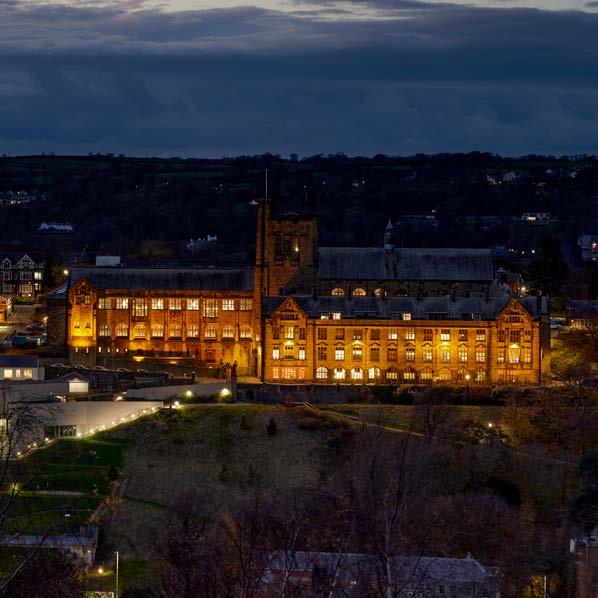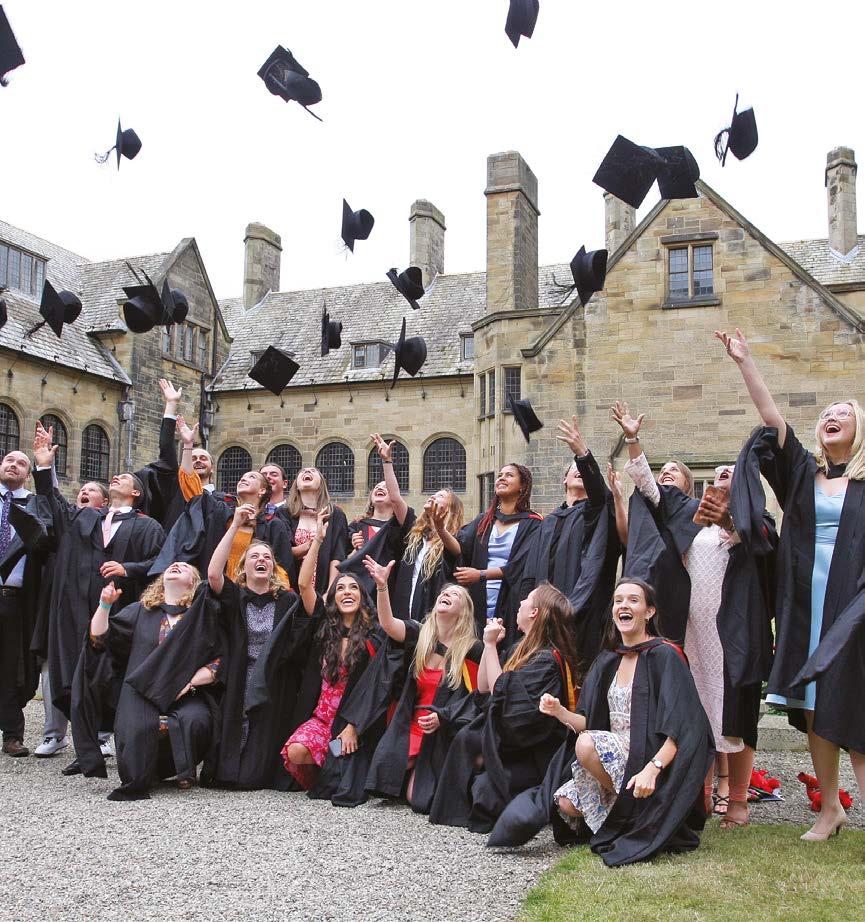

Vice-Chancellor’s Welcome Congratulations!
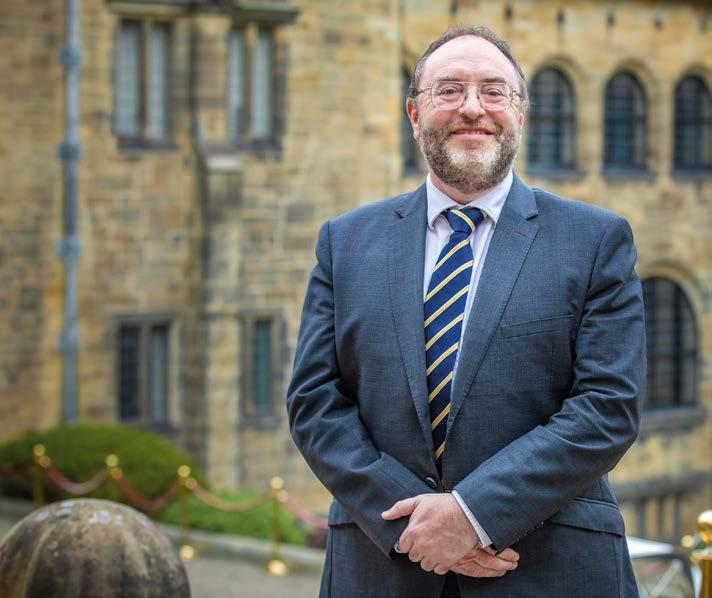
Growth and Transformation
Graduation is a significant milestone in every student’s life and today we are delighted to celebrate your achievements here at Bangor University!
Your university experience has taken you on a journey of growth and transformation. I would like to pay special tribute to you for your commitment and dedication to learning.
Graduation is the most important date in the higher education calendar. As Vice-Chancellor, I take great pleasure in attending these ceremonies, witnessing your success and celebrating the transformative power of a university education. We are delighted to be able to share the celebration for all our graduands with families, friends and supporters.
Whatever your chosen path, your University wishes you well for the future, and does so in the knowledge that Bangor has helped you to expand your mind and develop your skills, providing you with the knowledge, experience and networks to assist you as you navigate the next stages of your life.
Please remember that your connection to Bangor University will last a lifetime. You are now part of our thriving international alumni community and we will strive to continue to support you, wherever you are in the world. On behalf of the staff of the University, I wish you every success in achieving your goals.
Professor Edmund Burke Vice-Chancellor
Bangor University: Past, Present and Future
When the college first opened in 1884, it enrolled 58 students onto courses ranging from Greek, Latin, English and Welsh to Chemistry, Mathematics, Botany and Agriculture. As new departments and subjects were established, student numbers grew to around 300 at the turn of the 20th century. Major growth occurred in the 1950s and 1960s, and today over 11,000 students study here.
Today our world-leading research is seeking solutions to some of society’s most challenging problems - from improving health and wellbeing, protecting the environment, identifying low carbon energy solutions and providing cutting-edge solutions to advance the global 5G economy.
Our teaching is informed by original research in many of our disciplines. Students can be taught by academic staff who are research leaders in fields as diverse as healthcare and medical sciences, environmental science, business and music.
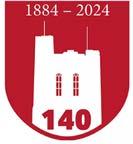
1884
Funded in part by quarrymen and farmers, Bangor University first opened its doors on 18 October 1884, based in an old coaching inn called the Penrhyn Arms.
1893
Bangor became one of the three original constituent colleges of the University of Wales.
1903
The city of Bangor donated a 10-acre site overlooking the city at Penrallt for a new building, and substantial sums of money were raised by local people to help meet the cost.
1907
The foundation stone of the University’s present Main Arts site was laid by Edward VII on 9 July 1907.
1911
The official opening of the University’s Main Arts building, built by Henry T. Hare, architect of London; together with some of the arts and social science buildings and part of the library.
1926
The University’s science departments moved to new, purpose-built accommodation which had been constructed with the assistance of funds raised by the North Wales Heroes Memorial Council, which also oversaw the construction of the Memorial Arch (off Deiniol Road) in 1923, to commemorate the North Walians who had lost their lives in the war.
1939
On 23 August 1939, a week before the Second World War began, the National Gallery in London began to evacuate its most precious paintings to Bangor, to escape the expected aerial bombing. More than 500 paintings, including works by Botticelli, Rubens and Rembrandt, were stored at the University’s Prichard-Jones Hall.
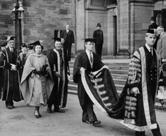
1949
On 28 April 1949, Her Majesty Queen Elizabeth II, then HRH Princess Elizabeth, was conferred the degree of Doctor of Music by HRH The Duke of Edinburgh, the newly-celebrated Chancellor of the University.
1952
The establishment of SVB (Student Volunteering Bangor), the volunteering branch of the Students’ Union.
1960s
The University shared in the general expansion of higher education in the UK following the Robbins Report, with several new departments and new buildings.
1967
The Beatles visited The Normal College for a lecture on Transcendental Meditation by the Maharishi Mahesh Yogi. The visit proved to be a pivotal date in the history of the group, as it is here that the news broke of the death of their manager, Brian Epstein.
1970s
Student protests in the 1970s focused on calls to expand the role of the Welsh language. A campaign against the College’s language policy by Cymdeithas y Cymric (The Cymric Society), saw slogans painted in Welsh on the walls of the Main Building, resulting in several suspensions of these activists.
1974
The protests and expulsions led to the establishment of the Bangor Welsh Students’ Union (Undeb Myfyrwyr Colegau Bangor – UMCB) and the opening of a Welsh Hall for the residents of the University, Neuadd John Morris-Jones.
1977
The merger of St Mary’s College was concluded.
1996
The merger of The Normal College was completed.
2003
The launch of Storm FM, the official student radio station for Bangor University, which went on air in March 2003.
2007
The change of name to Bangor University, or Prifysgol Bangor in Welsh, was instigated by the University, including the granting of degree-awarding powers to Bangor University itself.
2014
Bangor University signed a deal to create a new college in China; Bangor College China (BCC).
2015
The opening of Pontio Arts and Innovation Centre, where over 1000 people enjoyed a Welcome Day at the centre.
2018
Completion of M-SParc, the University-owned £20m science park on Anglesey.
2021
Bangor University celebrates 100 Years of Music, marking 100 years since composer E. T. Davies was appointed as the University’s first full-time Director of Music.
2022
The UK Government’s Research Excellence Framework ranks Bangor Top 30 in the UK for the societal impact of its research. 85% of our research is considered world-leading or internationally excellent.
2023
The establishment of a new North Wales Medical School is announced supported by Welsh Government and in partnership with Betsi Cadwaladr University Health Board.
2024
Bangor University celebrates its 140th anniversary.
A Unique Perspective
Bangor University’s Main Arts
Building remains the focal point of the University and was described by Cadw, the Welsh Government’s historic environment service, as ‘architecturally one of the most significant public buildings of the period in Britain’.
It was built between 1907-11 by Henry T. Hare, who was chosen following an architectural competition run by the University, following acquisition of the site in 1903.
The foundation stone was laid by Edward VII on 9 July 1907, and an official opening held on 14 June 1911. The resulting building is in a ’Collegiate Tudor‘ style and is based on the universities of Oxford, Cambridge and Durham, with Arts and Crafts influences.
The building is designed around two quadrangles: the Main Quadrangle; and the Inner Quadrangle, which is open to the public on Graduation Day and for special events.
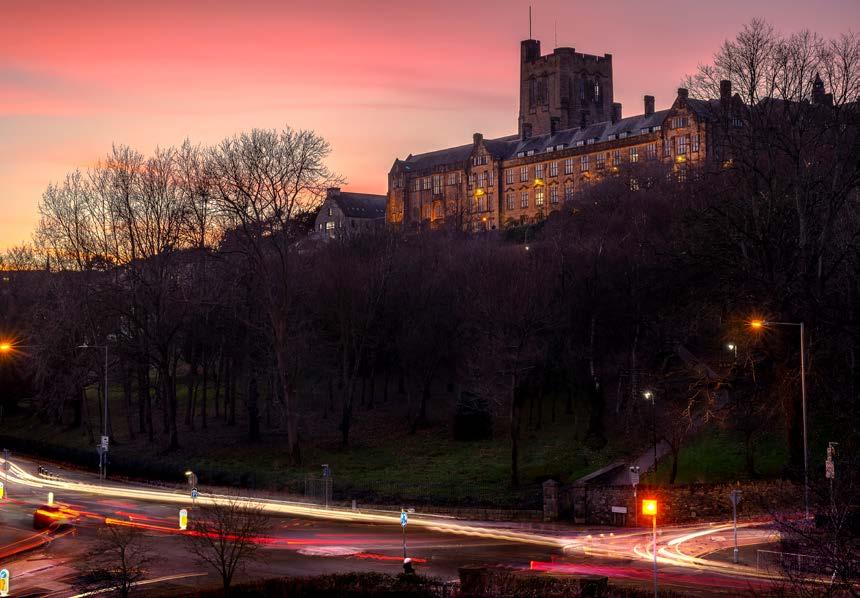

The Prichard-Jones Hall
The Prichard-Jones Hall, in which today’s graduation ceremony takes place, is named after Sir John Prichard-Jones, a draper of humble Anglesey origins who made his fortune in London’s Regent Street as managing director of Dickens and Jones department stores, acquired by Harrods in 1914.
Sir Prichard-Jones donated £15,000 towards its construction, encouraged to help the developing college in this way by David Lloyd George, an active supporter of the University, who was then Chancellor of the Exchequer, before going on to become UK Prime Minister. The hall’s interior has changed very little since its opening in 1911. The shields which decorate the top of the walls are representations of the ancient North Wales boroughs, and the pipe organ was installed following the closure of
the local Tabernacle church in the early 1970s. The electroliers (electrified chandeliers) still hang from the ceiling, and the walls are lined with the original wainscot panelling.
Used frequently by the University and the wider community, many generations of students have sat exams, danced and attended graduation ceremonies here. The hall also has a long tradition of hosting musical entertainment for North Wales, with performers including Sir Bryn Terfel and Aled Jones MBE.
Your Graduation
The Graduation ceremony
This is an opportunity to celebrate and reflect on the achievements of our students and enables the University community to acknowledge your accomplishments.
It is with great pride that we are now able to see our graduates taking their next exciting steps into the world, as so many others have done before them. Whether you are a graduand, a relative or a friend, we hope you have an enjoyable and inspiring day. Llongyfarchiadau! / Congratulations!
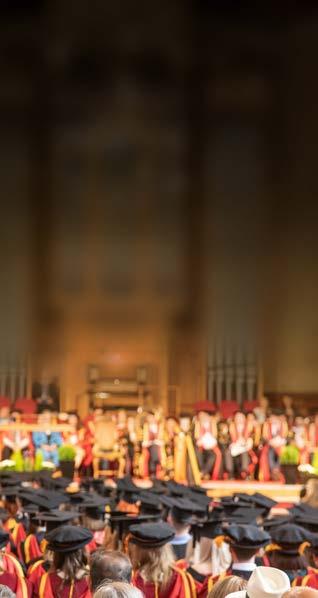
The Procession
Each ceremony begins with a procession. It is led by the Chief Marshal – a senior member of the University’s administrative staff –whose role is to ensure that the ceremony proceeds smoothly. Following the Chief Marshal in the procession will be several sections, each led by a Marshal(s) who are officers of the University:
Section 1:
Academic staff and civic dignitaries
Section 2:
Heads of School and Heads of central Professional Services departments
Section 3:
Senior officers of the University, including Pro-Vice-Chancellors and the Presenter
Section 4:
Honorary Fellows and their Presenters
Section 5:
The Chancellor’s procession, including the Vice-Chancellor and the Chancellor (or his deputy)
The final part of the procession, the Chancellor’s procession, is led by the Mace-Bearer, also a senior member of the University’s administrative staff.
The Chancellor
Bangor University’s Chancellor is the academic and physicist, Professor Sir Robin Williams.
The Chancellor is the University’s ceremonial head and one of its most prominent ambassadors. They work with the Vice-Chancellor and other senior officers to promote the University’s achievements at home and overseas.
Sir Robin is a Bangor graduate and a strong advocate of the bilingual nature of the University. He was appointed to the role in November 2022.
Sir Robin is an authority in the field of semiconductors and his research has been important in the development of digital electronics and the far-reaching changes in computing and communications. Working closely with industries worldwide, he developed new methods for the study of semi-conductors and was one of the first to use synchrotron radiation to study the surfaces of solids. Knighted in Queen Elizabeth II’s Birthday Honours in 2019 for services to higher education, research and the Welsh language, Sir Robin has served on many international and UK policy and funding bodies and on ministerial advisory groups for economic development and education in Wales.
He is a former chair of the Science Advisory Council for Wales. He was a member of the Innovation Advisory Council of Wales and was a founding fellow of the Learned Society of Wales. In 2022, the National Eisteddfod Science and Technology Medal was awarded to Sir Robin for his lifelong contribution to science.


Order of Proceedings
Music
Before the ceremony commences there will be a programme of music, ending with the processional music, which signals the start of the ceremony. Processional: John Stanley – ‘Trumpet Voluntary’ The procession
The Congregation is asked to stand as the procession enters the hall. This marks the formal start of the ceremony.
Introduction
The ceremony opens with a recitation by a student of the University of an extract from a poem, ‘Y Coleg ar y Bryn’ (‘The College on the Hill’) by the late Gwyn Thomas. The extract will be read in Welsh and English. Gwyn Thomas, who died in 2016, was a former Professor of Welsh at the University and National Poet of Wales from 2006 to 2008. The poem was commissioned by His Majesty King Charles III, then HRH The Prince of Wales, to mark the centenary in 2007 of the laying of the foundation stone of the Main University Building. The resolution
The Presenter, a senior academic, reads the resolution in Welsh and English granting authority to the Vice-Chancellor to award degrees, and also presents each group of students for their appropriate degrees and diplomas with the words (in Welsh): Honourable Vice-Chancellor, I present to you these students who have gained the degree of (…title of degree…) in (…name of the subject or subjects of study…)

Presentation of students
An Introducer, usually the Pro- Vice-Chancellor of the relevant department or his/her deputy, introduces students to the Vice-Chancellor by reading out their full names. Each student individually crosses the stage to be greeted by the Vice-Chancellor and the Chancellor (or his deputy).
Admission of students to degree
The Vice-Chancellor formally admits groups of students to their degrees by proclaiming (in Welsh): I admit you to the degree of (…title of degree…) and to all privileges of that degree.
The Chancellor (or his deputy) greets the graduates (in Welsh): Congratulations on receiving your degree today. The formula is then repeated for each group of students. Those named in the appropriate groups in the programme will be presented for their degrees in absentia.
Interlude
Approximately halfway through the ceremony, there will be a short musical interlude.
Education and Student Experience Awards
In some graduation ceremonies, the University will award an Education and Student Experience
Award to an individual member of staff who is considered to have made an outstanding contribution to teaching and/or the support of learning. Nominations for Education and Student Experience Awards are made by those best able to judge – the students themselves.
Honorary Fellowships and Degrees
In some graduation ceremonies, towards the end of the ceremony, Honorary Fellowships and Degrees are conferred by the University on individuals who have made a distinguished contribution to their chosen field of endeavour and whom the University wishes to honour. These are conferred by the Vice-Chancellor.
Concluding address
The ceremony is closed with an address to the new graduates and guests.
Hen Wlad Fy Nhadau / Land Of My
Fathers (national anthem of Wales) See lyrics overleaf.
Processional exit
The Congregation is asked to stand as the processional music begins and the procession leaves the hall.
Processional:
F. Mendelssohn – ‘War March of the Priests’
Hen Wlad Fy Nhadau / Land Of My Fathers
(national anthem of Wales)
Mae hen wlad fy nhadau yn annwyl i mi, Gwlad beirdd a chantorion, enwogion o fri; Ei gwrol ryfelwyr, gwladgarwyr tra mâd, Tros ryddid gollasant eu gwaed.
Chorus:
Gwlad, Gwlad, pleidiol wyf i’m gwlad, Tra môr yn fur i’r bur hoff bau, O bydded i’r heniaith barhau.
Hen Gymru fynyddig, paradwys y bardd; Pob dyffryn, pob clogwyn, i’m golwg sydd hardd
Trwy deimlad gwladgarol, mor swynol yw si Ei nentydd,afonydd, i fi.
Chorus
Os treisiodd y gelyn fy ngwlad dan ei droed, Mae hen iaith y Cymry mor fyw ag erioed, Ni luddiwyd yr awen gan erchyll law brad, Na thelyn berseiniol fy ngwlad.
Chorus
An Epic Anthem and its Origin
Composed in January 1856 by Evan James and his son James James, the song was performed for the first time in the vestry of Capel Tabor in Maesteg, by a singer called Elizabeth John. Its popularity spread after the Llangollen Eisteddfod in 1858; it was published in a best-selling collection of Welsh songs, and soon became a favourite at eisteddfodau and other patriotic occasions. Hen Wlad Fy Nhadau gradually became accepted as Wales’ national anthem - though to this day, it has no official status as such.

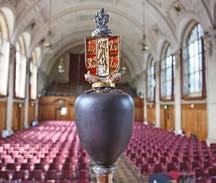
The Mace
The Mace is the symbol of the authority of the University and in the ceremony it always precedes the Vice-Chancellor.
The Mace was commissioned by the Old Students’ Association to commemorate the University’s centenary in 1984. The mace-head, crowned by a shield bearing the University coat of arms, is made of Bethesda slate. This symbolises the generosity of the local slatequarrymen who, in the early 1880s, gave part of their weekly wages to fund the establishment of the University.
Two ebony staffs carried by the Marshals are the gift of the fifth Lord Kenyon, who in 1981 completed 36 years of service as President of the University.
Summer 2025
Honorary Degrees




Our Honorary Fellowships & Degrees are prestigious awards bestowed upon distinguished individuals who have a connection with the University, or with Wales, and who have made an outstanding contribution to their chosen field.
Cheryl Foster MBE - Honorary Doctor of Science (Hon DSc)
Welsh football referee and former Wales international player – for contribution to Sporting Achievements
A pioneering figure in Welsh sport, Cheryl Foster MBE has excelled as both a player and referee, breaking barriers in a traditionally male-dominated field. Her outstanding career began at Bangor City FC, before she went on to play for some of the UK’s most prominent clubs including Liverpool FC Women. A former Wales international with 63 caps, she has helped raise the profile of women’s football. Transitioning to refereeing, she made history as the first Welsh woman to officiate at a FIFA Women’s World Cup and was named as the referee for the UEFA Women’s Champions League final in 2023. A passionate advocate for equality, grassroots development, and female leadership in sport, Cheryl is also a treble alumna of Bangor University, exemplifying lifelong learning and dedication.
Hanan Issa- Honorary Doctor of Letters (Hon DLitt)
Welsh Poet Laureate – for contribution to Welsh Culture, Language, Music, and the Arts
A Welsh-Iraqi poet, filmmaker, scriptwriter, and artist, Hanan Issa is the current Welsh Poet Laureate - the first Muslim to hold the title. Appointed following a public nomination and rigorous selection process, she champions the ancient Welsh poetic form cynghanedd and aims to broaden engagement with poetry. Her work explores themes of identity, belonging, and nature. A versatile creative, she wrote and directed The Golden Apple (2022) and contributed to Channel 4’s We Are Lady Parts. Her writing also features in notable anthologies, including Welsh (Plural): Essays on the Future of Wales and Just So You Know: Essays of Experience, which she co-edited.

Gwyn Lewis Williams - Honorary Doctor of Music (Hon DMus)
Music Director – for contribution to Welsh Culture, Language, Music, and the Arts
A Bangor University alumnus (MA Music 1970) and former lecturer, Gwyn Lewis Williams has enjoyed a distinguished career in the arts for over 50 years. A former professional trumpeter and BBC senior music producer, he has led major institutions including Theatr Ardudwy, Llangollen International Music Festival, and Tŷ Cerdd. A passionate conductor and champion of Welsh music, he has commissioned and premiered new works, mentored young talent, and promoted Welsh composers. Recently, he conducted Edward Elgar’s The Dream of Gerontius at the University, featuring 180 singers, the Bangor University Symphony Orchestra, and international soloists.

Toby Dixon - Honorary Doctor of Business Administration (Hon DBA)
Founder and Managing Partner of Growth Fund 1 – for services to Business and Entrepreneurship
Alumnus Toby Dixon (BA Business & Marketing 2002) has built a successful career in sustainable and impactful entrepreneurship. He founded Marlin Green, a £30+ million multinational recruitment firm, serving as CEO and Chairman. Toby now invests in ventures promoting employee wellbeing and environmental innovation across sectors such as EV charging, water management, and personalised nutrition. He supports social enterprises like Syntherix, a cancer drug in clinical trials, and is an early investor in Steven Bartlett’s Flight Fund. His latest venture, Growth Fund 1, is an exclusive private equity fund focused on sustainable, high-growth opportunities.

Professor David T Jones - Honorary Doctor of Medicine (Hon MD)
Former General Manager of Clwyd Health Authority – for Regional Contribution
Professor David T Jones has a longstanding relationship with Bangor University, becoming its first Honorary Fellow in 1988. A former GP and senior health service administrator, he was instrumental in developing community hospitals and improving services for people with learning difficulties. He played a key role in the planning and consultation process for Ysbyty Glan Clwyd and was known for his strong engagement with local GPs. He served as Chief Medical Officer and later General Manager of Clwyd Health Authority. Through philanthropic donations to the University, Professor Jones has established the David T Jones Celtic Fine Art Fund and The Eleanor Henderson Pearson Prize for Midwifery, in memory of his late Mother.
Professor Pedr ap Llwyd PLSW - Honorary Doctor of Letters (Hon DLitt)
Former Chief Executive Officer and National Librarian of the National Library of Wales - for contribution to Welsh Culture, Language, Music, and the Arts
Professor Pedr ap Llwyd, former Chief Executive and National Librarian of the National Library of Wales, has played a leading role in making knowledge, culture, and heritage more accessible to people across Wales. He championed major digitisation and outreach projects, helping transform the Library into an open and inclusive national resource. A Bangor University graduate, he has built strong links with the University and supported Welsh cultural research. Deeply connected to North Wales, his recent work with the National Heritage Lottery Fund shows his dedication to the region, including support for key heritage projects in Llanberis and Bethesda.
Sharon Manning MBE - Honorary Doctor of Science (Hon DSc)
Former Macmillan cancer nurse specialist – for Public Service
Sharon Manning, originally from Lancashire, dedicated over 30 years to the NHS in Wales. Beginning her career as a cleaner in 1989 at Glan Clwyd Hospital, she progressed to become a Macmillan Gynaecology Oncology Specialist Nurse. Inspired to qualify as a nurse in 2000, she trained at Bangor University (BN Nursing 2004) and later pioneered the use of the Rocket Drain, a service enabling cancer patients to manage symptoms at home. Her innovation transformed palliative care and was adopted across North Wales. Sharon received a Macmillan Innovation Award and Fellowship in 2017 and retired in 2022 after years of compassionate, patient-centred care.


Dr Keith Hiscock MBE - Honorary Doctor of Science (Hon DSc)
Marine Conservationist – for Outstanding Scholarship and Innovation
Dr Keith Hiscock has been a driving force in UK marine conservation for over 50 years. His pioneering work in Marine Protected Areas, species monitoring, and underwater habitats began during his PhD (Marine Biology 1976) at Bangor University (then the University College of North Wales). A skilled diver and underwater photographer, he published over 90 scientific papers and several influential books. He led national programmes on marine biodiversity and advised government bodies, playing a key role in shaping marine policy. Awarded an MBE in 2023, Keith continues to inspire marine scientists through his research, and commitment to the UK’s marine environment.
Alison Field - Honorary Doctor of Science (Hon DSc)
President and Chair of the Royal Forestry Society - for Public Service
In 2024, Alison Field became the 77th President and Chair of the Royal Forestry Society, marking a distinguished 50-year career in forestry across the public and private sectors. A trailblazer for women in the profession since graduating from Bangor (BSc Forestry 1978), she is one of the few to have reached its highest levels. Her leadership spans the Forestry Commission, National Forest, English Woodlands Forestry Ltd, and other key organisations. Known for her commitment to diversity, public service and enterprise, Alison has made a lasting impact across the UK, with notable contributions to woodland management in Wales and beyond.
Congratulations, you’re a graduate!
You are now joining our diverse community of alumni who are excelling in their chosen careers with the skills and support they have received at Bangor.
Alumni Bangor’ is the University’s association for former students. We don’t want to lose touch with you after graduation. By maintaining lifelong links with past students, we are committed to promoting your achievements and facilitating contact between friends and departments, and supporting new networks.
Our graduate community transcends barriers of generation and geography with alumni worldwide meeting and helping each other – in many cases without ever having met during their student life. You are now a member of this invaluable network!
To ensure that you’re part of our growing alumni network, make sure we have your current contact details by completing our online update form and opting-in to alumni communications.
It’s Not Goodbye!
Your alumni community
As a Bangor alumnus, you can benefit from a range of services, including:
• Alumni E-News: we send out monthly e-newsletters to keep you up-to date with the latest news from the University, including details on reunions and events and information about the research and activities taking place in our Schools and Colleges.
• Library access: alumni can continue to access the University’s excellent libraries with an Alumni Library Card.
• Information about alumni networks and groups, including groups on social media such as LinkedIn and Facebook.
Where will your journey take you?
Stay in touch with our alumni community and share your own story.
Scan to opt in to alumni communications.
bangor.ac.uk/alumni
Deepen your understanding by continuing your higher education journey with us
Postgraduate taught
Our postgraduate taught courses offer access to our subject matter experts and advanced facilities, helping you develop skills and gain the right qualifications.
Students who have graduated at Bangor may be eligible to receive a discount of up to 20% for postgraduate taught courses.
Postgraduate research
Practice your research skills surrounded by peers and professors who share your passion for advancing the world’s understanding of your chosen area of study.
Careers and Employability Service
Did you know that as an alum of Bangor University, you can use the University’s Careers and Employability Service for three years after you graduate? Access to careers advice and information can be just as important to you after graduation as when you were a student.
Graduation is an exciting and important milestone for every one of us - the period after graduation is full of change, yet it can also be challenging.
Here are some of the ways the Careers and Employability Service can help our graduates:
• CV and application support and feedback.
• Interview preparation.
• Assisting unsure or worried graduates on ‘what to do next’.
• Improve job / opportunity searching.
• Trying new approaches where graduates have been unsuccessful with their applications.
• Explore ways of gaining experience and establishing / improving their networks.
Bangor University graduates can also take advantage of a ‘for life’ account (through our CareerConnect online portal), offering a host of tools, resources and opportunities.
Scan to learn more about our postgraduate discount.
As a Bangor University graduate, all you need to do to continue / reconnect with our service is set up a graduate account on Bangor CareerConnect (careerconnect.bangor.ac.uk)
- you’ll be invited to do this as soon as you graduate. Sign up using your personal email address and we will merge your student account into your new graduate account.
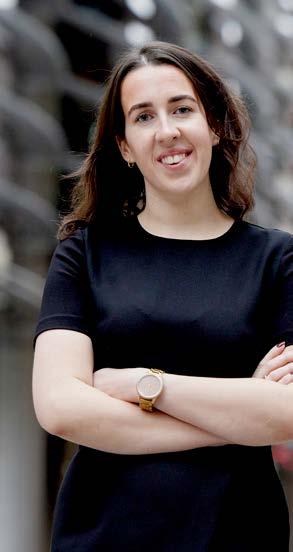
‘Opportunities at Bangor helped secure my role in an international company.’
Awen Edwards
Solicitor at
